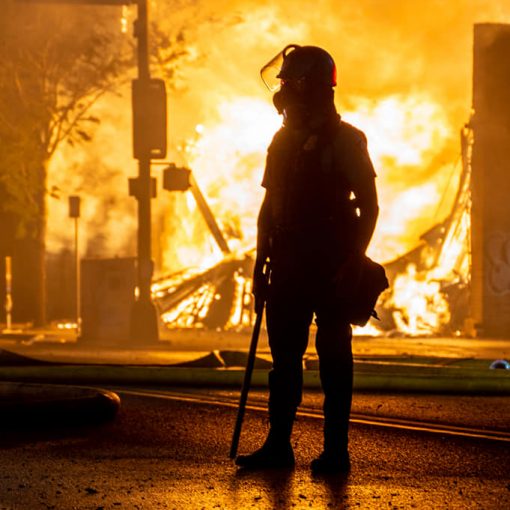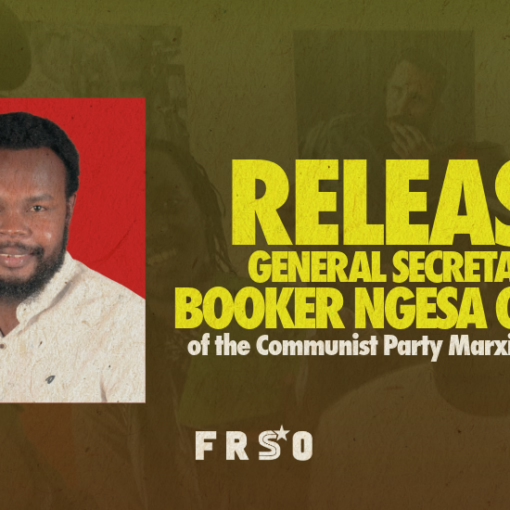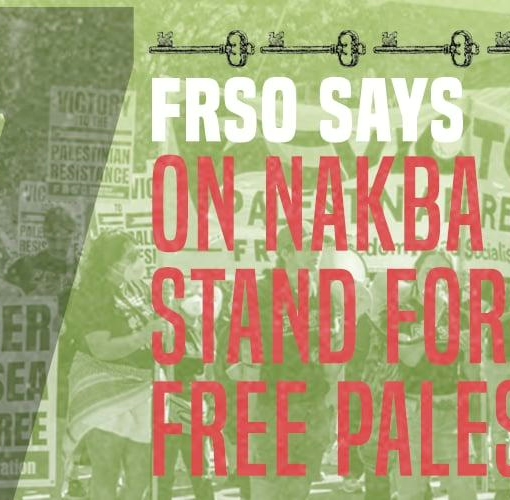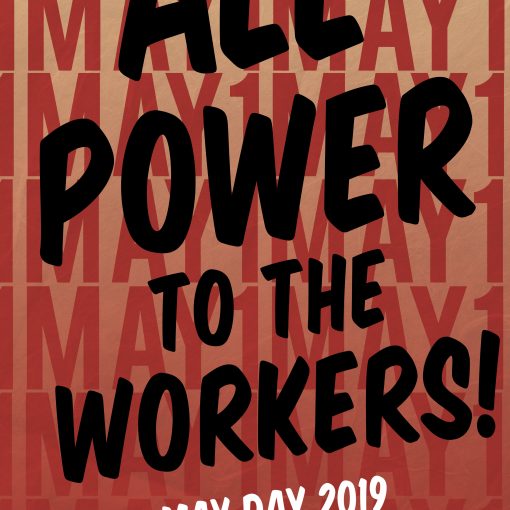|
The Movement Against War in Iraq: By Freedom Road Socialist Organization |
| Click here for PDF pamphlet version of this document |
Lessons From 17 Years of Aggression and Resistance
Iraq has been under attack by the United States government and military for the past 17 years. The current war and occupation has lasted for four years, and the U.S. faces military defeat by the Iraqi resistance. The American people do not support the war and want the troops brought home. It is an important time to look back at the movement against the war, try to learn some of the lessons that are available and look ahead to the tasks for the U.S. anti-war movement.
1990 – 1991
The U.S. war began when George Bush Sr. imposed sanctions on Iraq in 1990, under the pretext of stopping the Iraqi invasion of Kuwait. The ruling class of the United States spoke in virtually one voice in support of the attack. The summer of 1990 marks the beginning of the U.S.movement against war in Iraq.
The aims of U.S. imperialism in Iraq are the same today as in 1990: The first is unfettered access to the vast oil reserves of Iraq; second is political, economic and military domination of the Middle East (where the masses of people deeply hate imperialism); lastly, the U.S. seeks to expand its empire and contend with Europe for control of resources.
The movement against the Gulf War was largely led by international solidarity organizations that opposed interventions in Central America, as well as left wing forces. At the time, many of the organizations that now make up United for Peace and Justice, including some closely tied to the Democratic Party, called their own national demonstration to support “sanctions not war.” Consistent anti-imperialists opposed this view, recognizing sanctions themselves as an act of war.
1990-2003
The impact of 12 years of sanctions on the people of Iraq speaks for itself. Today, no one in the anti-war movement will defend the sanctions as an act of peace or diplomacy. The important lesson learned from this is that the Democratic Party has its own interests separate from the interests of those who want to see an end to the war.
The Gulf War came at a time of great confusion and disarray in the U.S. Left, marked by the collapse of the Soviet Union and Bush Sr.’s declaration of a “New World Order.” As a result, for years, the US anti-war movement was weak while half a million Iraqis were killed by devastating sanctions and 25 bombing raids a day. It was Iraqi challenges to the sanctions regime and unprecedented weapons inspections by foreign spies that finally brought attention to the unfolding war.
Voices in the Wilderness, which comes out of the Catholic Worker movement, was among the first to respond. From 1996 to 2003, they took hundreds of anti-war and anti-intervention activists to Iraq to protest sanctions, bring material support to Iraq, and return to the US with the passion and clarity to make sanctions an issue for the movement here. Faithbased activists, progressives and anti-imperialists played a big role in actions opposing Clinton’s bombing of Iraq in 1998 and those groups form the core of today’s local anti-war organizations and coalitions.
By 2002 the sanctions regime was crumbling. Opposition among the people to the devastating impact of sanctions was merging with a lack of support for the sanctions in the United Nations as France and Russia desired to reopen the free flow of Iraqi oil. U.S. policy had long been aimed at regime change in Iraq. Both Clinton and Bush hoped the sanctions and one of the longest air wars in U.S history would lead to a regime change. Ultimately, the Bush administration undertook to overthrow Saddam Hussein because in the face of all this pressure, he would not allow the US interests to dominate Iraq. Iraqi resistance was intolerable to the U.S. The Bush administration tried to link Iraq and Saddam Hussein to the attacks by Al-Qaeda on September 11, 2001. It is now well known that this and all the other rationales for war were bald-face lies. Following the September 11 attacks, contradictions within the ruling class were muted. Bush used this to push a call for war with Iraq.
Before the 2003 invasion of Iraq, there was a massive global outpouring of protests against the war. Millions of people marched on every continent to, “Stop the War Before it Starts.” This anti-war movement brought together the activists in existing anti-war groups, activists who last marched against the war in Vietnam or interventions in Central America and people who had never been to a demonstration before.
This movement was broad and large, but not particularly militant. With its consistent anti-imperialist politics, International ANSWER developed into an important national force at this time. The national coalition, United for Peace and Justice began in this period, largely to
counter ANSWER’s politics.
2003 – Today
Once the war began, the Iraqi government fell within months and on May 1, 2003, George Bush declared “Mission Accomplished.” The Iraqi resistance has made him rue that declaration every day since.
The Bush administration has established a puppet regime in Iraq, with sham elections held at the point of an occupier’s gun. The United States has no right to dictate to Iraqi people who their leaders should be. On a daily basis, the main attack on the freedom of every Iraqi woman and man comes from U.S. occupation and war. In the face of this we uphold the right of self-determination for Iraq. It is the Iraqi resistance, not the puppet government in Baghdad, which truly represents the Iraqi people.
Every force in the Iraqi resistance should be measured against the degree to which they are opposing the U.S. led occupation. Some groups are doing more than others when it comes to promoting unity in the national liberation movement, or a national democratic agenda. A wide variety of forces, including many political parties, have organized military organizations. Some are resisting the occupation and others are assisting the U.S. Some oppose the occupation some of the time. The U.S., other western imperialists, and some regional powers are trying to incite and utilize conflict on religious and national lines. This is in service of their own interests, not the interests of the Iraqi people. Patriots are trying to unite the nation against occupation and we support all who are working to emancipate their country.
In this historic battle against the United States, the Iraqi resistance grows stronger everyday. It is impossible to envision a time when the occupation will be able to establish control in Iraq. Instead, it is the resistance that will bring peace with justice to Iraq. At the same time, a defeat of the US in Iraq will weaken imperialists on every front, and help us in our own battles on the home front.
As communists in the anti-war movement, we have three main tasks:
- Build the movement for troops out now
- Develop anti-imperialist politics, including understanding and support for the Iraqi resistance and
- Raise the social costs of the war at home by raising the level of militancy within the movement, in order to end the war more quickly.
Troops Out Now, Our Main Task
The American people want the troops to come home. Some of them are confused by the issue of timelines but as time passes those theoretical timelines will come and go. We should be clear that the issue is not troops out sometime, it is troops out now. We need to struggle with the united front for a “No Timelines, But Now” position.
The Iraqi resistance and the U.S. defeat are playing a remarkable role in domestic politics. The war derailed Bush’s plans to wreck Social Security and influenced the November, 2006 elections from suburban park board seats to the U.S. Senate.
The war will continue to play a central role in national politics, certainly between now and the November 2008 elections. We know that neither the Republican nor Democrats can pull the troops out of Iraq. The political and economic power of U.S. imperialism is at stake and exiting Iraq in defeat will be a big blow. That said we should aim our main fire at the Republicans at this time, while not having illusions about what the Democrats will do about the war if they take the presidency in 2008. As the masses demand the troops to come home, the advanced are becoming radicalized. Many are disappointed and angry that the democrats are not acting decisively to end the war, and over time this anger will grow.
As the masses demand that the troops come home, the advanced are becoming radicalized. The intermediate, (many of these people are the base of the Democratic Party) put their hopes that the next president will end the war. We know that this can’t happen. This intermediate will become radicalized when they realize it too.
In the mean time, we have the important task of building the anti-war movement bigger, broader, deeper, and stronger. This has a number of components. We want national level organization that has a clear “Out Now!” position. We support calls for national days of action, and national mobilizations, because they play an organizing force within the movement.
The Democrats plan to use the war to win the election. Forces close to them like Move On! and Win Without War will try to harness the antiwar movement for that purpose. They will continue to put forward misleading and incorrect politics supporting timelines and half measures. We need to build the section of the anti-war movement which is independent of the bourgeois parties and work to put it in a position to contend with these forces.
As part of broadening the movement and splintering bourgeois party influence on its political line, we should work to strengthen it within broad sectors of society. A good example of this is groupings like Labor Against War. These formations allow us to engage many different sectors of society with the anti-war movement and broaden the influence of our political perspective.
Struggle for an Anti-Imperialist View Within the U.S. Anti-War Movement
There are many reasons to oppose the war, but not all are based on an anti-imperialist perspective. The ruling class itself is divided on how to proceed in Iraq; anti-imperialists must not fall into bourgeois reasoning. We do not oppose the war because America’s power and prestige is diminished by the failing US war effort. We do not support the view that the Iraq has become a breeding ground for terrorists (unless you are talking about those trained by the US military). It doesn’t matter to us when the war is criticized by allies of U.S. imperialism. We are not concerned about the challenges to the oil industry posed by instability in the Middle East. We aren’t calling for an end to the war because the puppet regime in Baghdad isn’t a successful bourgeois democracy.
Instead, we oppose the war because it is a war of aggression by the imperialist United States, aimed at seizing direct or indirect control of Iraq’s political and economic life, along with advancing imperial goals in the important Middle East region. This viewpoint is expressed in many of the demands we raise in the anti-war movement.
Many forces in the anti-war movement raise the slogan, “Bring the troops home” This is a good demand, as it would bring an end to the occupation of Iraq. In raising it, we can oppose the unofficial economic draft, which draws many working class and oppressed nationality youth into the U.S. military. At the same time, the most brutal crimes – rapes, massacres, disappearances – are part and parcel of the occupation. As anti-imperialists, we cannot overlook the atrocities committed by US forces in Iraq. Those who carry out these crimes, as well as the officers who direct the soldiers and condone these actions, should be called to account for the inhuman acts visited upon the Iraqi people.
While the anti-war movement correctly concentrates its attention on Iraq, anti-imperialists must respond to U.S. goals of reshaping the entire Middle East region to serve its interests. Threats against Iran and Syria must be opposed; we must oppose aid to reactionary governments in the Middle East, and an end to U.S. collaboration with and aid to Israel. The 59-year Israeli occupation of Palestine is a constant antagonism, while decades of Palestinian struggle for land, political power and the right to return, inspire patriots throughout the Arab world to continue to fight for their own liberation.
Finally, as communists, we have a special responsibility to the Iraqi resistance, which has breathed new life into the Arab struggle against imperialism. We recognize the Iraqi resistance as patriots, struggling for the independence of their nation. We struggle with the advanced to embrace the Iraqi resistance as a legitimate national liberation struggle that deserves our respect and support. Among the broader masses, we work to build an understanding of why Iraqis are fighting, and an acceptance that their resistance is legitimate. Ultimately, the greatest support we can give the Iraqi resistance is to tie the hands of their opponents by building a strong movement against the war. While raising the level of political support for the resistance is important, it can not form the basis of unity in the anti-war movement.
Raise the Social Costs of the War
Mass sentiment is on the side of the anti-war movement. It is up to the advanced to turn it into a movement that raises the social costs of the war. This means targeting individuals and institutions of the ruling class that are tied to the war, and taking actions that bring the war home to the American people.
People do not see the body bags on TV. This is intentional. Images of the dead and wounded from the Vietnam War had a tremendous impact on support for the war. While the sanitized media coverage tempers things the longer the war goes on, the more people become outraged with it, the more radicalized the movement will become. The student movement against the war is poised to explode as the level of militancy grows and as people see the end of the Bush presidency as a political opening for a policy change.
This isn’t to say that every demonstration should have a militant action attached; time, place and conditions still drive things. The main thing is that the anti-war movement has been stuck in a “mass permitted rally” framework for too long. We already know that big rallies will not stop the war. We need to engage in civil disobedience, direct action and street heat protests that stop business as usual. This kind of confrontation will do the most to tie the hands of the warmakers, and weaken them in their battles against the Iraqi people. Moreover, as the demands of the movement are sharper, and our tactics are uncompromising, bourgeois politicians will lose their ability to take cover behind the anti-war movement.
We need to take a long term view of our tasks and tactics. The anti-war movement is set for an explosion of growth and radicalization. Nonetheless the war will not end in 2008 and possibly not for years afterward. We need to continue to build organizations and infrastructure that can be maintained over the long term but is flexible enough to respond to changes in conditions on the ground.
Freedom Road Socialist Organization
May 2007





